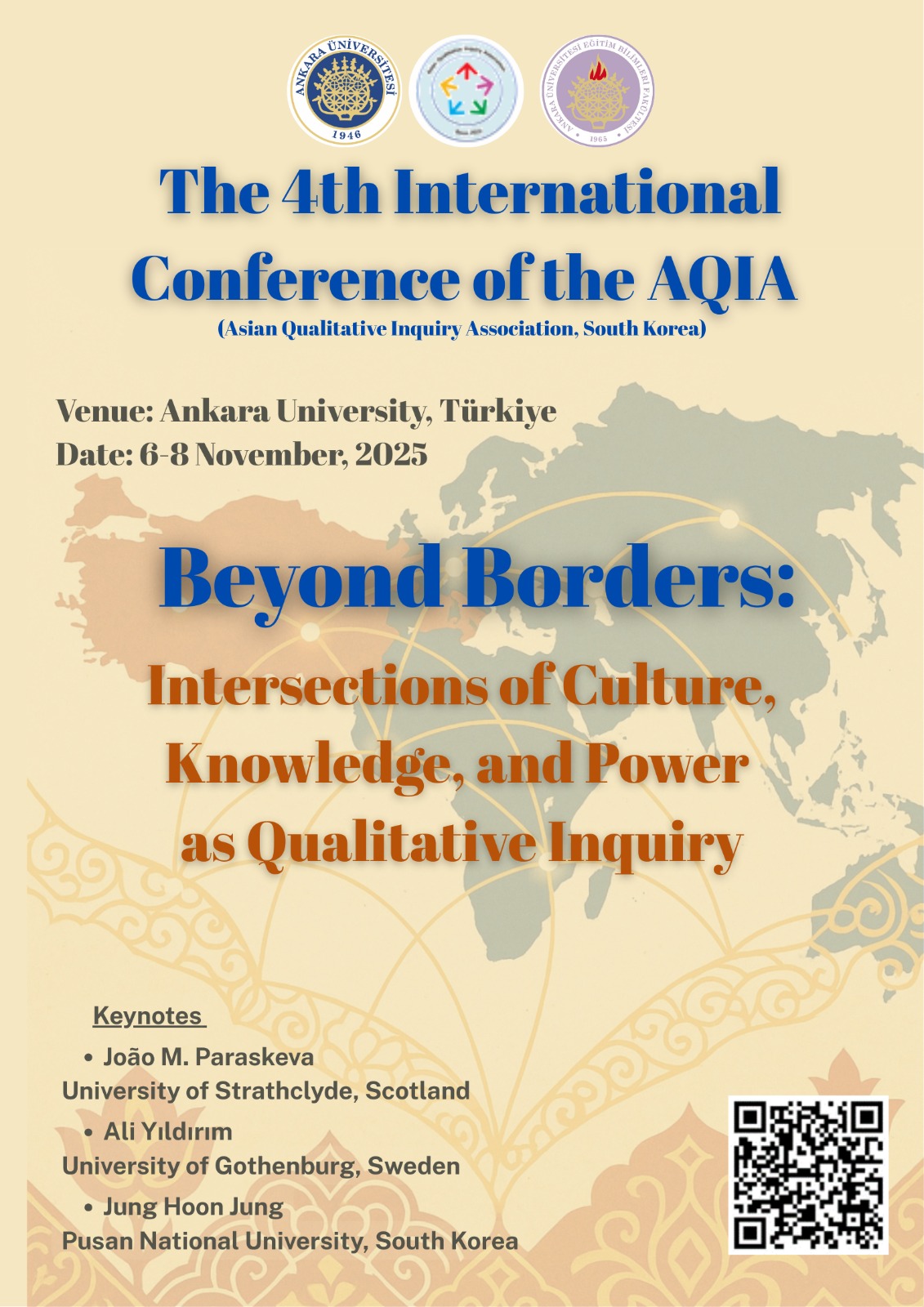|
아시아질적탐구학회에서 2025년도 국제학술대회를 아래와 같이 개최할 예정입니다.
일시: 2025년 11월 6~8일 장소: 터키(튀르키예) 앙카라 대학교 주제: Beyond Borders, Intersections of Cultures, Knowledge and Power as Qualitative Inquiry
초록 접수: 5월 1일 ~ 7월 15일 https://icaqia2025.ankara.edu.tr/abstractsubmission/
관련 사이트:
아시아질적탐구학회 http://www.asianqi.org/index.ink
터키 앙카라 대학교 https://icaqia2025.ankara.edu.tr/en/mainpage/
Event | Date | Abstract Submission Opens | May 01, 2025 | Abstract Submission Closes | July 15, 2025 | Notification of Accepted Abstracts | August 15, 2025 | Registration Opens | August 17, 2025 | Registration Closes | September 20, 2025 | Program Announcement | October 01, 2025 | Abstract Book Publication | October 20, 2025 | CONGRESS Start Date | November 06, 2025 | CONGRESS End Date | November 08, 2025 | Gala Dinner | November 08, 2025 |
|
|

How to Submit Your Abstract We welcome abstract submissions for the 4th International Conference of the Asian Qualitative Inquiry Association (AQIA 2025), Ankara University, T?rkiye.
- Abstract Guidelines:
Your abstract should be a maximum of 400 words (in English) and must include the following components:- Aim of the study
- Scope and focus
- Conceptual or theoretical framework
- Methodology
- Analysis
- Conclusion or expected contribution
- Author Information:
Please include your full name, institutional affiliation, and contact information (email address) below the abstract text. - Submission:
Abstracts should be sent via email to:
 aqia@ankara.edu.tr aqia@ankara.edu.tr
--------------------------------------------------------------------------------------------
The interplay between history, culture, and education suggests a need for a broad interdisciplinary theme. The focus on migration, multiculturalism, and subjectivities connects well with contemporary global issues. The deconstruction of Western narratives and post-Orientalist research suggest a critical approach to discourse. The Asian values and ethnographic perspectives hint at a conference interested in indigenous knowledge and autoethnography. By fostering critical dialogue and collaborative research, the conference aspires to expand the boundaries of knowledge and offer fresh perspectives on the past, present, and future of Asia in the global context. This conference aims to critically explore and engage with the evolving discourses of Asia through interdisciplinary perspectives. By bringing together scholars, researchers, and practitioners from diverse fields, the conference seeks to: - Reframe Knowledge Production ? Challenge Eurocentric narratives and explore post-Orientalist and indigenous perspectives on Asia.
- Examine Cultural and Historical Transformations ? Investigate the dynamic interplay between tradition and modernity, with a focus on Asian values, Turkish identity, and global influences.
- Interrogate Migration, Multiculturalism, and Asian lives ? Address how mobility, transnationalism, and shifting identities shape cultural belonging and socio-political structures.
- Analyze Education and Learning Cultures ? Explore how shadow education, transboundary learning, and ethnographic studies contribute to knowledge systems in Asia and beyond.
- Engage with Autoethnography and Representation ? Encourage critical self-reflection and narrative methodologies to understand Asian lived experiences.
- Discuss Gender, Race, and Subalternity ? Foster debates on power, marginalization, and agency in the context of women’s studies, ethnic studies, and post-West research.
- Bridge Discourses?create a platform for scholars to discuss Asia as discourse, examining its historical, cultural, and philosophical intersections.
- Predict Future Trends ? Explore the trajectory of socio-political, economic, and cultural shifts that define the emerging identities of Asia.
Themes of the conference - History, Philosophy, and Asian Values
- Life, Culture, and Ethnography in the Turkish Context
- Children, Family, and Development
- Schooling, Shadow Education, Trans-boundary Learning Culture
- Migration, Multiculturalism, and Changing Identities
- Women, Race, and Subaltern Studies
- Asian I and Autoethnography
- Fieldwork, Representation, and Politics of Writing
- Ethnic Studies, Post-Orientalism, and Post-West Research
- Netnography: Culture, identities and pedagogy in the post-digital age
- AI & human factor in the post-digital age
- Rethinking Identity, Culture, and Education in Asia
- Asia in Transition: Histories, Discourses, and Future Perspectives
- Asia as Discourse: Knowledge, Representation, and Cultural Encounters
- Dialogues on Culture, Migration, and Education
- Decentering the West: Post-Orientalist Approaches to Asian Studies
- Multiple Modernities in Asia: New Perspectives on Identity and Development
- Autoethnography and Representation: Narrating Life, Culture, and Politics in Asia
AQIA committees: Regional Director(Board Member): Brunei, Yusrita Zolkefli, University of Brunei Darussalam Sri Lanka, Sarah Wijesinghe, Taylor’s University in Malaysia Iran, Rokhshad Tavakoli, Sultan Qaboos University, Iran Nepal, Binaya Subedi, Ohio State University United Arab Emirate, Paolo Mura, Zayed University India, Shyam Menon University of Delhi Hong Kong, Koji Matsunobu Hong Kong Institute of Education South Korea, Dongsung Lee, JeonJu National University of Education Vietnam, Ngo Thi Phuong Lan, National University of Vietnam Turkey, Nihat G?rel Kahveci, Istanbul University Philippines, Michael Cahapay, Mindanao State University Kazakhstan, Anna CohenMiller, Nazarbayev University?Research Ethics Chair South Korea, Dongsung Lee, JeonJu National University of Education ?Administrative Staffs South Korea, Jae sung Jo, Gwangju National University of Education South Korea, Gi hong, Bang, Chinju National University of Education South Korea, Yeosun Yun, Chinju National University of Education ? Audit South Korea, Sang-won Jeong, Chuncheon National University of Education
|